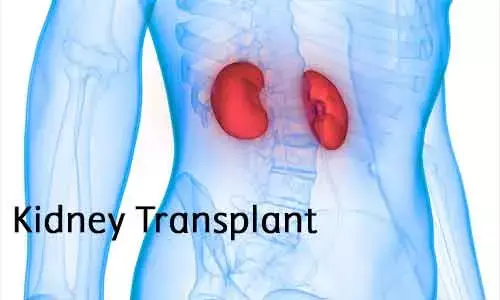- Home
- Medical news & Guidelines
- Anesthesiology
- Cardiology and CTVS
- Critical Care
- Dentistry
- Dermatology
- Diabetes and Endocrinology
- ENT
- Gastroenterology
- Medicine
- Nephrology
- Neurology
- Obstretics-Gynaecology
- Oncology
- Ophthalmology
- Orthopaedics
- Pediatrics-Neonatology
- Psychiatry
- Pulmonology
- Radiology
- Surgery
- Urology
- Laboratory Medicine
- Diet
- Nursing
- Paramedical
- Physiotherapy
- Health news
- Fact Check
- Bone Health Fact Check
- Brain Health Fact Check
- Cancer Related Fact Check
- Child Care Fact Check
- Dental and oral health fact check
- Diabetes and metabolic health fact check
- Diet and Nutrition Fact Check
- Eye and ENT Care Fact Check
- Fitness fact check
- Gut health fact check
- Heart health fact check
- Kidney health fact check
- Medical education fact check
- Men's health fact check
- Respiratory fact check
- Skin and hair care fact check
- Vaccine and Immunization fact check
- Women's health fact check
- AYUSH
- State News
- Andaman and Nicobar Islands
- Andhra Pradesh
- Arunachal Pradesh
- Assam
- Bihar
- Chandigarh
- Chattisgarh
- Dadra and Nagar Haveli
- Daman and Diu
- Delhi
- Goa
- Gujarat
- Haryana
- Himachal Pradesh
- Jammu & Kashmir
- Jharkhand
- Karnataka
- Kerala
- Ladakh
- Lakshadweep
- Madhya Pradesh
- Maharashtra
- Manipur
- Meghalaya
- Mizoram
- Nagaland
- Odisha
- Puducherry
- Punjab
- Rajasthan
- Sikkim
- Tamil Nadu
- Telangana
- Tripura
- Uttar Pradesh
- Uttrakhand
- West Bengal
- Medical Education
- Industry
DPP-4 inhibitors and SGLT2 inhibitors effective in diabetics after kidney transplant

Greece:Evidence regarding the utilization of DPP-4 inhibitors and particularly SGLT2 inhibitors and GLP-1 receptor agonists is limited in renal transplant recipients (RTRs).
Incretin based therapies DPP-4 inhibitors and SGLT2 inhibitors are both safe and effective in recipients of kidney transplant, suggests a recent study published in the journal Diabetes Research and Clinical Practice.
There is a limited evidence on the use of DPP-4 inhibitors and particularly SGLT2 inhibitors and GLP-1 receptor agonists in renal transplant recipients (RTRs). Dora Oikonomaki, Evaggelismos General Hospital, Athens, Greece, and colleagues therefore, aimed to conduct a systematic review and meta-analysis regarding the utility of incretin-based therapies including dipeptidyl peptidase-4 (DPP-4) inhibitors and glucagon-like peptide-1 (GLP-1) receptor agonists as well as sodium-glucose co-transporter-2 (SGLT2) inhibitors in people with posttransplantation diabetes mellitus (PTDM).
For the purpose, the researchers searched the online databases for publications on Kidney/Renal Transplantation and DPP-4 inhibitors, GLP-1-receptor agonists and SGLT-2 inhibitors. It included studies that in which these antidiabetics were used.
Overall, sixteen studies and 310 people were included in the analysis.
Key findings of the study include:
- Participants received DPP-4 inhibitors in 8 studies, SGLT-2 inhibitors in 6 studies and GLP-1 receptor agonists in 2 studies, with a mean follow-up of 22.03 ± 14.95 weeks.
- Hemoglobin A1c (HbA1c) reduction was demonstrated in 10 studies (mean +/- standard deviation (MD) = - 0.38 %).
- MD of HbA1c was -0.3741 and -0.4596 mg/dl for DPP-4 inhibitors and SGLT-2 inhibitors respectively. Nine studies demonstrated differences in fasting plasma glucose (FPG) (MD = – 25,76) and 5 studies in post-prandial glucose (PPG) (MD = – 6.61) before and following treatment.
- Most studies did not show adverse effects on the glomerular filtration rate (GFR) and hepatic function.
"DPP-4 inhibitors and SGLT2 inhibitors appear both efficacious and safe in renal transplant recipients. More high-quality studies are required to guide therapeutic choices for PTDM," wrote the authors.
The study, "Incretin-Based Therapies and SGLT-2 Inhibitors in Kidney Transplant Recipients With Diabetes," is published in the journal Diabetes Research and Clinical Practice.
DOI: https://doi.org/10.1016/j.diabres.2020.108604
Dr Kamal Kant Kohli-MBBS, DTCD- a chest specialist with more than 30 years of practice and a flair for writing clinical articles, Dr Kamal Kant Kohli joined Medical Dialogues as a Chief Editor of Medical News. Besides writing articles, as an editor, he proofreads and verifies all the medical content published on Medical Dialogues including those coming from journals, studies,medical conferences,guidelines etc. Email: drkohli@medicaldialogues.in. Contact no. 011-43720751


